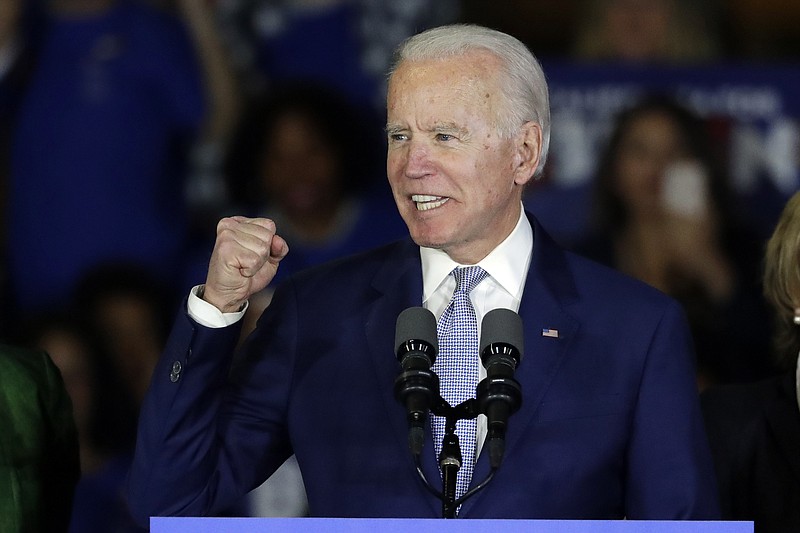A triple-bylined Associated Press story, carried by the Times Free Press on Saturday, purports to tell about "one of the most remarkable turnabouts in modern American politics," the resurrection of now-Democratic nomination front-runner Joe Biden.
It's what the article leaves out, or likely leaves out, that's telling.
The numbers show that Biden, 77, a longtime Delaware U.S. senator and vice president for eight years under former President Barack Obama, has the current edge in delegates over U.S. Sen. Bernie Sanders, I-Vermont, 78.
What they don't show is that the nomination process, such as it is, has led to a settling by the party for the gaffe-prone political lifer now making his third run for the presidency.
The AP story covers the 72-hour period between the South Carolina primary on March 1 and the Super Tuesday primary in 14 states last week.
After Biden resoundingly won the South Carolina primary, which he had been expected to do but which since then has been made by pundits into somewhat of a remarkable feat, former South Bend, Indiana, Mayor Pete Buttigieg and Minnesota U.S. Sen. Amy Klobuchar quickly jumped out of the race.
The AP story tells of a Buttigieg conference call with aides, who told him the road ahead was bleak. It speaks of a Sunday call with Obama.
But his campaign knew, or should have known, he already had no path to the nomination. A declared win in Iowa and a close second in New Hampshire had not ratcheted up the excitement for the former mayor. So his decision was no magnanimous moment, but the call with Obama - with perhaps the promise of a chat touting him to his former vice president - probably helped grease the skids.
The story also details Klobuchar having her a-ha moment in a historically black church in Selma, Alabama, on the Sunday morning after the South Carolina primary. It portrays her deciding between staying in the race through Super Tuesday and winning her home state or dropping out and endorsing Biden. She decided on the latter.
The truth was she had no path to the nomination, either, and, according to the Real Clear Politics polling average, already had fallen dramatically out of the lead in her home state. Her decision, far from "what is better for our country," which is what she told NBC, was one to save face. She didn't want to finish third in her home state, which is what happened to her nomination rival, Sen. Elizabeth Warren of Massachusetts, on Super Tuesday.
And then there's former New York City Mayor Michael Bloomberg, whose money had launched him into the race with the original hope of contending on Super Tuesday, when he would first be on ballots. He'd thrown so much money in the race that when he was in Chattanooga in February even his handlers had handlers. The press badges for the one campaign stop in the Scenic City were nicer than fancy luggage tags.
The AP story of the recent events describes the former mayor's "team of pollsters and analysts" poring over the candidate's "sophisticated data operation" after the South Carolina primary. But it said even having the best data couldn't change things after Biden's win.
The truth, which the story acknowledges near its end, is that Bloomberg was finished after his poor showing in his first Democratic debate in Las Vegas several weeks earlier. His money and his left-center politics had given him a legitimate shot to jump into the race and be a factor. But by South Carolina, many Democrats were looking elsewhere.
Buttigieg and Klobuchar had no upcoming groups of states that could save them, former hedge fund billionaire Tom Steyer had put all his eggs in South Carolina's basket and come up short, and Warren was going nowhere in the South, or much of anyplace else. And the only other option was Sanders, the self-proclaimed democratic socialist many thought could lose to President Donald Trump in a landslide.
That left Biden, who'd led the race since its inception (with the exception of Oct. 8, 2019, when Warren briefly eclipsed him) until Feb. 10. Since then he'd been in free fall, with embarrassing finishes in Iowa and New Hampshire and little money coming in.
But suddenly he was all they had to stop Sanders and a potential thumping by Trump. Not the smiling former vice president but a man who can't remember what state he's in, a man who challenged someone who questioned him to a push-up contest and a man who former Obama Defense Secretary Robert Gates said has "been wrong on nearly every major foreign policy and national security issue over the past four decades."
It's this Biden Democrats have to get behind, and it's this Biden that the national press already has begun to plump up, to excuse his misstatements and to write, in so many words, that he's not nearly as bad as you think.
His resuscitation last week may have been a "most remarkable turnabout," but it says much more about the Democratic field than it does about him.
